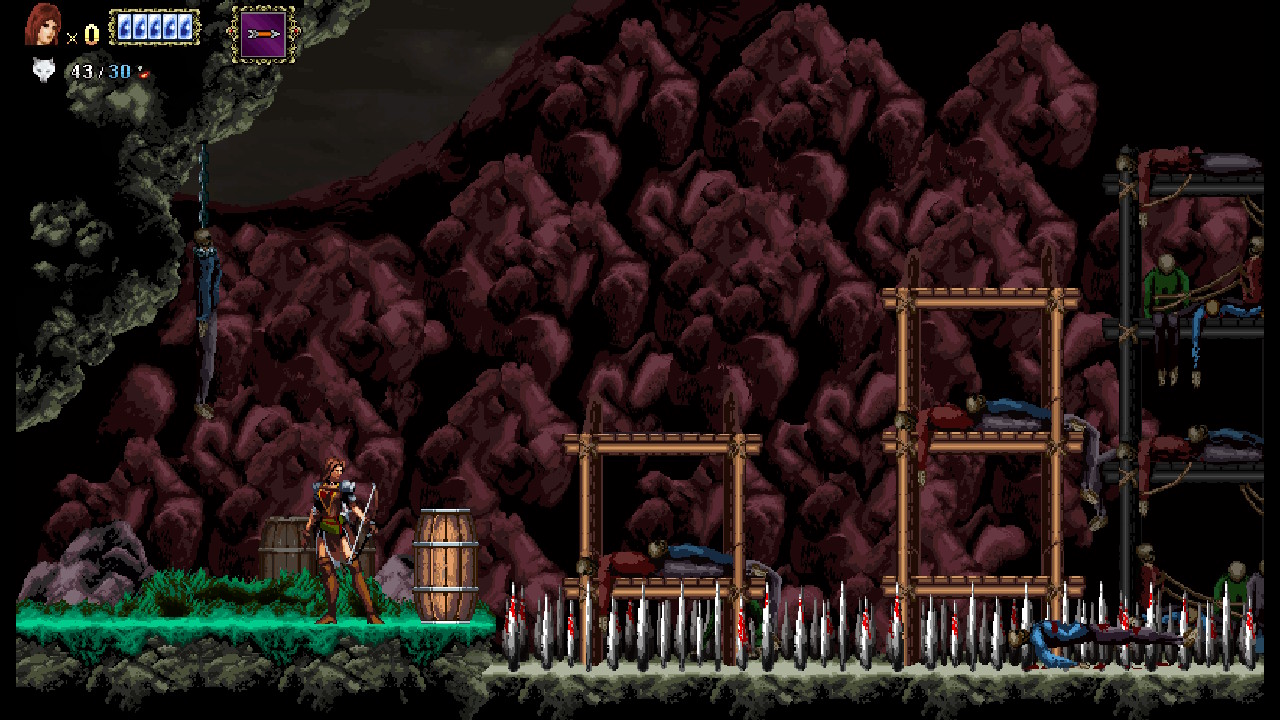Dracula is a timeless threat to us mere mortals, one that has slipped into books, movies and video games ever since Irish writer Bram Stoker first created the figure in the late 19th Century. For the inspiration behind their new video game however, Migami Games have turned to the real-life figure that Stoker may have used as his inspiration: Vlad the Impaler, Prince of Wallachia. Vlad ruled with a violent and bloody reign in Romania in the 15th Century, and this is the setting in which Wallachia: Reign of Dracula adopts.
The story begins with Elcin, a young lady skilled with a bow and arrow who, while out hunting one day, returns home to discover her village has been burned to the ground, with her parents among the victims. Her brother has been taken hostage by Prince Dracula, whose army had inflicted the destruction. And so, she sets off in a side-scrolling action game that instils the 16-bit spirit, right down to the sprites with few frames of animation and the parallax scrolling backdrops.

Elcin is an agile warrior, running, jumping and sliding responsively to controller input, armed with a bow discharging an endless supply of arrows and a sword to cut through the enemies who get a little too close for comfort. Foes seem to pop up everywhere, and the best tactic is to keep firing those arrows, which can be dispatched in eight directions. There is little time for respite.
The game utilises a more grounded selection of foes rather than relying on the supernatural; it is predominantly soldiers and wild animals that will sabotage your plans to rescue your brother. Downed enemies drop little orbs which, when enough are collected, can be used to call aid from one of several companions, who can each help turn the tide of battle (and who are particularly effective when you are faced with a boss fight). The four potential helpers each have their own skills, including Silviu the wolf who will loyally advance ahead into the enemy, while elderly Christian has magic powers in-hand to ease the pressure.

Comic-book style cut scenes with effective voice-overs set the story, and the in-game music provides a homage to the 16-bit tunes that SNES gamers may remember. Migami Games themselves cite Castlevania as an influence for Wallachia, and this inspiration is true to a point, although the levels are more linear than the sprawling areas that Castlevania adopts. There is some variety in locations across the seven stages, and technically, the game is proficient without excelling.
There are checkpoints and limited lives but losing them all in a level will send you back to the start; there are, thankfully, unlimited continues. Back in the 80s and 90s, the concept of retreading old ground when you lost all your lives was accepted as The Way Things Are, but in Wallachia it can be frustrating at times as the game basically becomes a test to memorise the enemy attack patterns. Various difficulty modes are selectable, although if you opt for Easy you are – bizarrely – unable to complete the whole game.

Wallchia: Reign of Dracula admirably refers to a genuine historical figure for its take on the Dracula story, and offers a fair amount of content for the price, including a selection of unlockable mini games which will offer a temporary diversion from the main campaign. If you are a fan of 2D scrolling action happy to battle against the odds in an authentically 16-bit arcade adventure, then you will find Wallachia to be a nostalgic journey to sink your teeth into.
Wallachia: Reign Of Dracula Review £12.99
Summary
Wallachia sticks to the 16-bit gaming template – warts and all – to deliver a fun ride for fans of retro 2D scrolling adventures. Repetition may limit the appeal however; this is a Dracula story that perhaps lacks bite.

